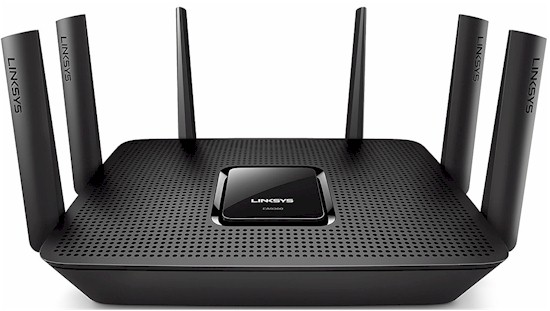
Read on SmallNetBuilder

The review does not recommend the EA9200.The EA9200 had poor test results for 5ghz. Not sure I’d recommend it.
5 GHz downlink clearly shows something wrong with the EA9300's performance. I've been working since early June with Linksys and octoScope to try to track down the source of the problem. The BCM4365 radio SoC was suspected at first. But the NETGEAR R7000P uses the same device and clearly doesn't have a problem. This could just be an incompatibility between the QCA-based octoScope Pal test client and Broadcom's new 3x3 AC radio SoC that won't be seen in real-world use. But since the R7000P works fine, there could also be an issue in Linksys' implementation. I've told Linksys I'll retest the product if they resolve the problem.

Linksys is still pursuing the issue.That doesn't look like an issues with the PAL cards as clients
I don't measure power consumption. These things typically draw under 10W.What is the idle power comsumption?
I don't measure power consumption. These things typically draw under 10W.
Simultaneous throughput of what?Another thing I'm missing is the simultaneus throughput.
Simultaneous throughput of what?
I no longer measure it for wired or wireless because I found the measurements were misleading, especially on wireless. Wi-Fi is half duplex.
The EA9300 looks pretty much like the EA9300,
Agreed, Linksys used to be high quality routers with good performance. It appears that for several years now, they have released routers for sale that the end user is the beta tester.
Thanks for the catch. Fixed.Typo in 6th paragraph?
I guess that should say it looks like the EA9500?
Well said. I was chasing the newest router technology for years... I ended up with the Asus RT-68U w/ Merlin firmware, and it was pretty good... way better than most, but then I went the Ubiquiti route. Setup sucked. It was a pain. Also, it's not as easy for me to go in and make quick changes. The UI just isn't as intuitive. That being said, my wireless performance has never been more rock solid, uptime is expressed in months, and routing performance is amazing as well. Also, it wasn't expensive... Just an edgerouter X + one of their access points.Behavior will not change unless buyers break the cycle and leave stuff on the shelves. Unfortunately, with social media and YouTube "stars" pumping the hype machine, and people still being sucked in by inflated speed numbers, things won't change anytime soon.
Well said. I was chasing the newest router technology for years... I ended up with the Asus RT-68U w/ Merlin firmware, and it was pretty good...
Generally WiFi performance has not improved since the release of 802.11ac
We use essential cookies to make this site work, and optional cookies to enhance your experience.
